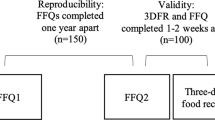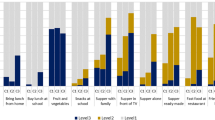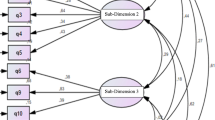Abstract
Objective:
Development and validation of a questionnaire to measure children's attitudes towards breakfast.
Design:
A pilot study was used to select questionnaire items and assess test–retest reliability. The questionnaire was then administered to a larger sample of children together with a dietary recall questionnaire. Randomly selected subsets of these children also completed a dietary recall interview or their parents were asked to complete a questionnaire relating to their child's breakfast eating habits.
Setting:
Primary schools in south, west and north Wales, UK.
Subjects:
A total of 2495 children (199 in pilot testing, 2382 in the main study) in years 5 and 6 (aged 9–11 years).
Results:
The 13-item scale showed good construct validity, high internal reliability and acceptable test–retest reliability. Boys displayed more positive attitudes towards breakfast than girls but differences between the two age groups did not reach statistical significance. Children who did not skip breakfast displayed more positive attitudes than children who skipped breakfast. In addition, more positive attitudes towards breakfast were significantly correlated with consumption of a greater number of ‘healthy’ foods for breakfast (i.e., fruit, bread, cereal, milk products), consumption of fewer ‘unhealthy’ foods for breakfast (i.e., sweet items, crisps) and parental perceptions that their child usually ate a healthy breakfast.
Conclusions:
The breakfast attitudes questionnaire is a robust measure that is relatively quick to administer and simple to score. These qualities make it ideal for use where validity at the individual level is important or where more time-consuming dietary measures are not feasible.
This is a preview of subscription content, access via your institution
Access options
Subscribe to this journal
Receive 12 print issues and online access
$259.00 per year
only $21.58 per issue
Buy this article
- Purchase on Springer Link
- Instant access to full article PDF
Prices may be subject to local taxes which are calculated during checkout
Similar content being viewed by others
References
Ajzen I (1985). From intentions to action: a theory of planned behaviour. In: J Kuhl J and Beckman (eds). Action Control: From Cognitions to Behaviors. Springer: New York:, NY, pp 11–39.
Benton D, Parker P (1998). Breakfast blood glucose and cognition. Am J Clin Nutr 67, 772S–778S.
Benton D, Sargent J (1992). Breakfast blood glucose and memory. Biol Psychol 33, 207–210.
Benton D, Slater O, Donohoe RT (2001). The influence of breakfast and a snack on psychological functioning. Physiol Behav 74, 559–571.
Berg C, Jonsson I, Conner M (2000). Understanding choice of milk and bread for breakfast among Swedish children aged 11–15 years: an application of the Theory of Planned Behaviour. Appetite 34, 5–19.
Bro RT, Shank L, Williams R, McLaughlin TF (1994). The effects of an in-class breakfast program on attendance and on-task behaviour of high school students. Child and Family Behavior Therapy 16, 1–8.
Chandler AK, Walker SP, Connolly K, Grantham-McGregor SM (1995). School breakfast improves verbal fluency in undernourished Jamaican children. J Nutr 125, 894–900.
Conner M, Armitage CJ (1998). Extending the theory of planned behaviour: a review and avenues for further research. J Appl Soc Psychol 28, 1429–1464.
Cromer BA, Tarnowski KJ, Stein AM, Harton P, Thornton DJ (1990). The school breakfast program and cognition in adolescents. J Dev Behav Pediatr 11, 157–158.
Cureton E, D'Agostino R (1983). Factor Analysis: An Applied Approach. Lawrence Erlbaum: Mahwah, NJ.
Edmunds LD, Ziebland S (2002). Development and validation of the Day in the Life Questionnaire (DILQ) as a measure of fruit and vegetable questionnaire for 7–9 year olds. Health Educ Res 17, 211–220.
Haines PS, Guilkey DK, Popkin BM (1996). Trends in breakfast consumption of US adults between 1965 and 1991. J Am Diet Assoc 96, 464–470.
Lloyd HM, Rogers PJ, Hedderley DI, Walker AF (1996). Acute effects on mood and cognitive performance of breakfasts differing in fat and carbohydrate content. Appetite 27, 151–164.
Lytle LA, Nichaman MZ, Obarzanek E, Glovsky E, Montgomery D, Nicklas T et al. (1993). Validation of 24-hour recalls assisted by food records in third-grade children. J Am Diet Assoc 93, 1431–1436.
Maio GR, Haddock G (2007). Attitude change. In: Kruglanski AW and Higgins ET (eds). Social Psychology: Handbook of basic principles, Vol. 2. Guildford Press: New York, NY.
Martens MK, va Assema P, Brug J (2005). Why do adolescents eat what they eat? Personal and social environmental predictors of fruit, snack and breakfast consumption among 12–14-year-old Dutch students. Public Health Nutr 8, 1258–1265.
Moore GF, Tapper K, Murphy S, Clark R, Lynch R, Moore L (2007). Validation of a self completion measure of breakfast foods, snacks and fruit and vegetables consumed by 9–11 year old schoolchildren. Eur J Clin Nutr 61, 412–419.
Moore L, Tapper K, Dennehy A, Cooper A (2005). Development and testing of a computerised 24-hour recall questionnaire measuring fruit and snack consumption among 9–11 year olds. Eur J Clin Nutr 59, 809–816.
Morgan KJ, Zabik ME, Stampley GL (1986). Breakfast consumption patterns of U.S. children and adolescents. Nutr Res 6, 635–646.
Nicklas TA, Myers L, Reger C, Beech B, Berenson G (1998a). Impact of breakfast consumption on nutritional adequacy of the diets of young adults in Bogalusa, Louisiana: ethnic and gender contrasts. J Am Diet Assoc 98, 1432–1438.
Nicklas TA, O'Neil CE, Berenson GS (1998b). Nutrient contribution of breakfast, secular trends, and the role of ready-to-eat cereals: a review of data from the Bogalusa Heart Study. Am J Clin Nutr 67, 757S–763S.
Nicklas TA, Reger C, Myers L, O'Neil C (2000). Breakfast consumption with and without vitamin-mineral supplement use favourably impacts daily nutrient intake of ninth-grade students. J Adolesc Health 27, 314–321.
Petty RE, Wegener DY, Fabrigar LR (1997). Attitudes and attitude change. Annu Rev Psychol 48, 609–647.
Pollitt E (1995). Does breakfast make a difference in school? J Am Diet Assoc 95, 1134–1139.
Powell CA, Walker SP, Chang SM, Grantham-McGregor SM (1998). Nutrition and education: a randomised trial of the effects of breakfast in rural primary school children. Am J Clin Nutr 68, 873–879.
Ruxton CH, Kirk TR (1997). Breakfast: a review of associations with measures of dietary intake, physiology and biochemistry. Br J Nutr 78, 199–213.
Shemilt I, O'Brien M, Thoburn J, Harvey I, Belderson P, Robinson J et al. (2003). School breakfast clubs, children and family support. Children and Society 17, 111–112.
Siega-Riz AM, Popkin BM, Carson T (1998). Trends in breakfast consumption for children in the United States between 1965 and 1991. Am J Clin Nutr 67, 748S–756S.
Smith AP (1998). Breakfast and mental health. Int J Food Sci Nutr 49, 397–402.
Smith AP, Clark R, Gallagher J (1999). Breakfast cereal and caffeinated coffee: effects on working memory, attention, mood and cardiovascular function. Physiol Behav 67, 9–17.
Smith AP, Kendrick A, Maben A, Salmon J (1994). Effects of breakfast and caffeine on cognitive performance, mood and cardiovascular functioning. Appetite 22, 39–55.
Smith AP, Kendrick AM, Maben AL (1992). Effects of breakfast and caffeine on performance and mood in the late morning and after lunch. Neuropsychobiology 2, 198–204.
Sutton S (2004). Determinants of health-related behaviours: Theoretical and methodological issues. In: Sutton S, Baum A and Johnston M (eds). The Sage Handbook of Health Psychology. Sage: London, pp 94–126.
Tapper K, Murphy S, Moore L, Lynch R, Clark R (2007). Evaluating the Free School Breakfast Initiative in Wales: Methodological Issues. Br Food J.
Unsan N, Sanlier N, Danisik H (2006). Comparison of attitudes towards breakfast by Turkish fourth graders living in Turkey and Germany. Appetite 46, 248–253.
Vaisman N, Voet H, Akivis A, Vakil E (1996). Effect of breakfast timing on the cognitive functions of elementary school students. Arch Pediatr Adolesc Med 150, 1089–1092.
Wesnes KA, Pincock C, Richardson D, Helm G, Hails S (2003). Breakfast reduces declines in attention and memory over the morning in schoolchildren. Appetite 41, 329–331.
Wyon DP, Abrahamsson L, Jartelius M, Fletcher RJ (1997). An experimental study of the effects of energy intake at breakfast on the test performance of 10-year-old children in school. Int J Food Sci Nutr 48, 5–12.
Acknowledgements
Laurence Moore is supported by a Public Health Career Scientist Award funded by the Welsh Assembly Government. We thank Emily Harrop, Lorelei Simon, Iolo Madoc-Jones, Julian Buchanon and Joan Ashdown-Lambert for help with data collection, Zoe Macdonald for administrative assistance and Odette Parry for contributions to project management and data collection. We also thank the members of our advisory group (Andrew Smith, Rona Campbell, Barrie Margetts and Ian Shemilt), Janine Hale and Ruth Conway for their continued support and assistance and the Welsh Assembly Government for funding the research. In addition, we gratefully acknowledge the co-operation of all school staff, pupils and parents for participating in this study. The research was funded by the Health Promotion Division of the Welsh Assembly Government.
Author information
Authors and Affiliations
Corresponding author
Additional information
Guarantor: K Tapper. Contributors: KT, SM, LM, RC and RL developed and piloted the attitude, dietary and parental measures. RC, GM and KT developed the dietary coding scheme. KT and GM carried out the statistical analysis. KT drafted the paper and all authors contributed to the final paper.
Rights and permissions
About this article
Cite this article
Tapper, K., Murphy, S., Lynch, R. et al. Development of a scale to measure 9–11-year-olds' attitudes towards breakfast. Eur J Clin Nutr 62, 511–518 (2008). https://doi.org/10.1038/sj.ejcn.1602735
Received:
Revised:
Accepted:
Published:
Issue Date:
DOI: https://doi.org/10.1038/sj.ejcn.1602735
Keywords
This article is cited by
-
Attitude toward breakfast mediates the associations of wake time and appetite for breakfast with frequency of eating breakfast
Eating and Weight Disorders - Studies on Anorexia, Bulimia and Obesity (2022)
-
Applying an extended theory of planned behaviour to predict breakfast consumption in adolescents
European Journal of Clinical Nutrition (2017)
-
Ernährung, Bewegung und Substanzkonsum von Kindern und Jugendlichen
Bundesgesundheitsblatt - Gesundheitsforschung - Gesundheitsschutz (2016)
-
School-based intervention to promote eating daily and healthy breakfast: A survey and a case–control study
European Journal of Clinical Nutrition (2011)
-
Meal and snacking patterns of school-aged children in Scotland
European Journal of Clinical Nutrition (2009)



